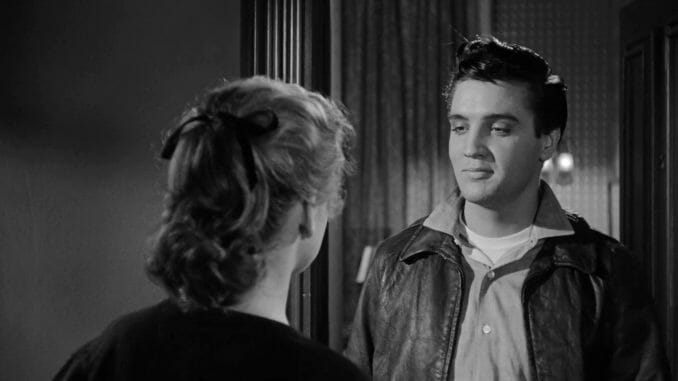Elvis Presley on Screen: The Good, the Bad, and the Bonkers

Elvis Presley made 31 movies between 1956 and 1969. Many were not what you’d call good. The scripts were full of witless jokes; the narratives could be downright ludicrous. Though obviously a talented performer, Presley’s acting ability—while certainly present—was far less consistent and transcendent than his singing.
And yet.
To tar all his films with the same brush would be to do them, and yourself, a disservice. Few of them are genuinely accomplished productions, and yet even fewer have nothing at all to recommend. Most were formulaic, but the formula allowed plenty of room for fascinating strangeness. A glittering array of co-stars, as well as a skilled director or two, helped give the movies an extra appeal. And sometimes, Presley’s acting could yield pleasant surprises.
That was the case in the greatest of his cinematic adventures, and Presley’s personal favorite, King Creole. Set in a headily atmospheric New Orleans, Presley plays a plucky young nightclub singer who runs afoul of mobster Maxie Fields (Walter Matthau). In one of the rare roles that allowed him to exercise some range (the part was originally intended for James Dean), Presley acquits himself admirably, going toe to toe with the formidable Matthau and proving himself a worthy scene partner. Director Michael Curtiz weaves the requisite tunes into the action with an eye to narrative propulsion; it’s one of the rare Elvis movies where the music moves the story, and the plot isn’t just a flimsy excuse to string a bunch of songs together.
He did make movies with little music at all, however. Presley led several westerns, and in the best of them-Flaming Star—he only performs one song. Directed by Don Siegel, the film sees Presley play the son of a white father and Kiowa mother (admittedly dubious casting, but this was 1960) who becomes embroiled in a bloody war between his parents’ people. The most violent of Elvis’ filmography by quite some margin, Siegel gives Flaming Star his typical taut, pacy touch, and directs Presley to another solid, moody performance. Though he’s no Henry Fonda, it’s quite possible to watch his turn in Siegel’s film (or in his other westerns, like Love Me Tender and Charro!), and imagine him having a successful B-movie career akin to those enjoyed by Audie Murphy or Rory Calhoun.
A more typical Elvis movie—one that featured an album’s worth of music and a decidedly sunnier tone—and yet just as enjoyable as Flaming Star, was Viva Las Vegas. One of three films where he plays a racecar driver, the real reason to see Viva Las Vegas is the ferocious chemistry between Presley and Ann-Margret, who were having an affair during the shoot. In the worst of his formulaic movies, Presley could seem bored, uncomfortable and uninterested in his female leads, but the spark he shares with Ann-Margret makes Viva Las Vegas electric.
-

-

-

-

-

-

-

-

-

-

-

-

-

-

-

-

-

-

-

-

-

-

-

-

-

-

-

-

-

-

-

-

-

-

-

-

-

-

-

-








































